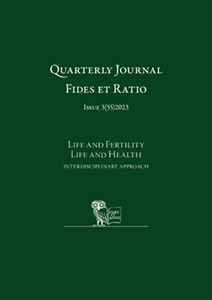Abstract
The aim of the presented research was an adaptation of Delta Questionnaire by Radosław Drwal in the group of people with mild intellectual disability and in the group of adolescents within the intellectual norm, as well as a preliminary analysis of its psychometric properties. The tool enables measurement of locus of control understood as a personality dimension (Drwal, 1995). The questionnaire was subjected to psychometric verification in research involving adolescents (178 adolescents with mild intellectual disability and 179 within the intellectual norm). The choice of respondents was arbitrary. The research was carried out in the context of resilience theory. For this reason, the analysis included results obtained from adolescents who have experienced a variety of difficulties in the course of their life. What is more, students with mild intellectual disability diagnosed with a genetic syndrome and adolescents with multiple disabilities were excluded from the study. The first stage of work on the adaptation of the Delta Questionnaire was verification of descriptive statistics and distribution analysis. Then, a reliability analysis of subscales was carried out. For this purpose, due to the dichotomous nature of the answers in the questionnaire, the Kuder-Richardson method was used. The next stage of the research was a confirmatory factor analysis. Finally, the tool was standardized. The obtained results allow us to conclude that the Delta Questionnaire is a tool which enables reliable and accurate measurement of locus of control in a group of adolescents with mild intellectual disability.
References
Agbenyega, J.S., Deku, P. (2016). Using a modified version of locus of control scale to explore children with disabilities’ perceived vulnerability to physical and sexual assault in three special schools in Ghana. Cogent Social Sciences, 2(1), 1256751. https://doi.org/10.1080/23311886.2016.1256751
Drwal, R.Ł. (1978). Poczucie kontroli jako wymiar osobowości- podstawy teoretyczne, techniki badawcze i wyniki badań. (W:) L. Wołoszynowa (red.), Materiały do nauczania psychologii, 307-345. Warszawa: Wydawnictwo Naukowe PWN.
Drwal, R.Ł. (1995). Poczucie kontroli jako wymiar osobowości- podstawy teoretyczne, techniki badawcze i wyniki badań. (W:) R.Ł. Drwal, P. Brzozowski, P. Oleś (red.), Adaptacja kwestionariuszy osobowości. Wybrane zagadnienia i techniki, 199-227. Warszawa: Wydawnictwo Naukowe PWN.
Filipiak, S., Łubianka, B. (2019). Poczucie kontroli w okresie wczesnej adolescencji wśród uczniów z dwóch etapów edukacji. Psychologia rozwojowa, 24(1), 85–96.
Guess, D., Benson, H.A., Siegel-Causey, E. (1985). Concepts and Issues Related to Choice-Making and Autonomy among Persons with Severe Disabilities. Journal of the Association for Persons with Severe Handicaps, 10(2), 79-86. https://doi.org/10.1177/154079698501000202
Katkovsky, W., Crandall, V.C., Good, S. (1967). Parental antecedents of children’s belief in internal-external control of reinforcement in intellectual achievement situations. Child Development, 38(3), 765-776.
Kościelak, R. (2010). Poczucie umiejscowienia kontroli i przekonania o własnej skuteczności w zdrowiu i chorobie. Kraków: Oficyna Wydawnicza Impuls.
Majewicz, P. (2002). Obraz samego siebie a zachowanie młodzieży niepełnosprawnej ruchowo. Kraków: Wydawnictwo Naukowe Akademii Pedagogicznej.
Nowicki, S., Strickland, B.R. (1973). A locus of control scale for children. Journal of Consulting and Clinical Psychology, 40(1), 148-154.
Oleszkowicz, A. (2006). Bunt młodzieńczy: Uwarunkowania. Formy. Skutki. Warszawa: Wydawnictwo Scholar.
Polański, G. (2018). Lokalizacja kontroli adolescentów a korzystanie z internetu. Edukacja – Technika – Informatyka, 3(25), 245- 250.
Rotter, J.B. (1966). Generalized expectancies for internal versus external control of reinforcement. Psychological Monographs: General and Applied, 80(1), 1-28.
Rotter, J.B., Chance, J.E., Phares, E.J. (1972). Applications of a social learning theory of personality. New York: Holt, Rinehart & Winston.
Shogren, K.A., Bovaird, J.A., Palmer, S.B., Wehmeyer, M.L. (2010). Locus of Control Orientations in Students with Intellectual Disability, Learning Disabilities and No Disabilities: A Latent Growth Curve Analysis. Research and Practice for Persons with Severe Disabilities, 35(3-4), 80-92. https://doi.org/10.2511/rpsd.35.3-4.80
Solomon, D., Houlihan, K.A., Busse, T.V., Parelius, R.J. (1971). Parent behavior and child academic achievement, achievement striving, and related personality characteristics. Genetic Psychology Monographs, 83(2), 173-273.
Stancliffe, R.J. (2001). Living with support in the community: Predictors of choice and self-determination. Mental Retardation and Developmental Disabilities Research Reviews, 7(2), 91-98. https://doi.org/10.1002/mrdd.1013
Wehmeyer, M.L. (1993). Perceptual and psychological factors in career decision-making of adolescents with and without cognitive disabilities. Career Development for Exceptional Individuals, 16, 135-146.
Wehmeyer, M.L. (1994). Perceptions of self-determination and psychological empowerment of adolescents with mental retardation. Education & Training in Mental Retardation & Developmental Disabilities, 29(1), 9-21.
Wehmeyer, M.L., Palmer, S.B. (1997). Perceptions of control of students with and without cognitive disabilities. Psychological Reports, 81(1), 195-206.
Ziółkowska, B. (2019). Radzenie sobie ze stresem młodzieży niepełnosprawnej fizycznie w świetle problematyki umiejscowienia kontroli. Niepełnosprawność. Dyskursy pedagogiki specjalnej, 36, 141-158.

